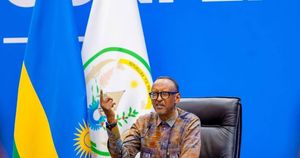OTTAWA — The Liberal Party of Canada brought its leadership candidates to Montreal for a French-language debate on February 24, 2025. Candidates Mark Carney, Chrystia Freeland, Karina Gould, and Frank Baylis clashed over pivotal issues affecting Canada's future, particularly focusing on their differing positions on the carbon tax.
The debate, moderated by former TVA-Québec anchor Pierre Jobin, ran from 8 p.m. to 10 p.m. and tackled various themes, including Canada-U.S. relations, affordability, housing, health care, and climate action. Each candidate had the opportunity to present their views amid increasingly polarized discussions on these topics.
During the debate, Freeland expressed her intention to eliminate the carbon tax on consumers, aligning her stance with other candidates who also called for changes to the current tax framework. She emphasized the need for comprehensive climate plans rather than relying solely on taxation as the solution to climate change. "We need to focus on larger systemic changes rather than putting the burden solely on consumers," Freeland stated.
Mark Carney echoed this sentiment, proposing to cancel the carbon tax for consumers, small and medium businesses, and farms. He advocated for a restructured system compelling larger polluters to bear more responsibility. Carney remarked, "It's imperative to reduce greenhouse gases, and we must also stimulate clean manufacturing to aid this transition." His focus on corporate accountability resonates with leaders aiming for sustainable economic growth.
Meanwhile, Frank Baylis took aim at the carbon tax, arguing it fails to address the climate crisis effectively. He proposed to reinvest the funds gained from the tax to directly combat climate issues, asserting, "The carbon tax doesn't solve the problem; we must invest these funds wisely to make tangible changes." His approach reflects concerns about taxation's impact on public perception and economic feasibility.
Karina Gould maintained her position against scrapping the carbon tax altogether, emphasizing her commitment to the fight against climate change. She pushed for canceling planned increases to the tax, reinforcing her stance with the assurance of maintaining Japan's commitments toward environmental goals.
The candidates didn't just focus on the carbon tax but also diversified their discussion around economic policies, housing affordability, and the pressing nature of Canada's relationship with the United States. When asked about upcoming elections, Gould noted, "Timing depends on the current geopolitical climate, especially if we find ourselves knee-deep in tariff wars with the U.S." Carney supported these views, advocating for the need for discussion about the best timing for government strategies.
Also highlighted during the debate was the threat posed by the current U.S. administration. Carney criticized Conservative Leader Pierre Poilievre's approach, stating, "Poilievre lacks the strength to unite Canadians against external pressures; we need to find collaborative solutions."
The candidates had compelling discussions on energy, proposing solutions like building pipelines to facilitate the movement of natural gas across Canada, which they viewed as pivotal environmental and economic objectives.
Knowledge of regional sensitivities was apparent when candidates addressed Quebec's unique position within Confederation. Freeland responded positively about recognizing Quebec's constitution, underscoring her commitment to bilingualism. Baylis opposed certain legislative measures, emphasizing the importance of respecting Quebec's identity.
The debate allowed the candidates to intersperse their key policy ideas with personal anecdotes, presenting their visions and reinforcing their identities to voters. Gould, for example, underscored her years of work behind the scenes on the high-speed rail project, emphasizing its long-term benefits for both the economy and the environment.
But it wasn't all smooth sailing; each candidate faced probing questions about their language abilities and handling sensitive issues, particularly from their opponents. Carney found himself under scrutiny after mistakenly agreeing with Hamas during the debate, leading to criticisms from Conservative spokesperson Sebastian Skamski.
Addressing the therapeutic nuances of immigration policies, candidates presented their takes on how to create effective and sustainable immigration systems, weighing the needs of economic stability against social responsibilities.
With their proposals, the debate clearly unveiled the dynamic range of opinions within the Liberal party on tackling contemporary challenges. Candidates like Freeland and Carney exhibited leadership qualities necessary for addressing climate action alongside economic imperatives, showcasing the depth of debate as Canadians look toward the future.
Overall, this debate sets the stage for potential shifts within party policies as they approach the next national election. The actions and suggestions put forward by candidates mark their commitment to balancing climate action with economic growth, showcasing diverse paths forward for Canada.



